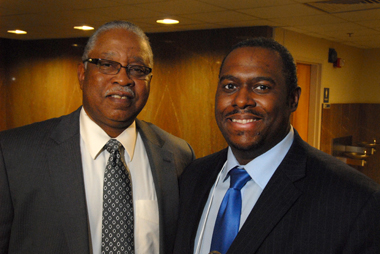Henry Frierson, who taught at the School of Education for 14 years before becoming associate vice president and dean of the graduate school at the University of

Florida, has been honored by the Black Alumni of the School of Education with its Impact Award.
The award is given by the group in recognition of dedication to recruiting, retaining, sponsoring and mentoring students of color at Carolina. It was presented to Frierson at BASE’s annual reunion event at the School of Education on Nov. 9.
Frierson served on the School of Education faculty from 1993 to 2007, when he left for the position in Florida. He also served on the faculty at the UNC-Chapel Hill School of Medicine, from 1974 to 1993, where he was a professor and founded the Learning and Assessment Laboratory, and academic support unit that he directed until 1990.
In 1996, Frierson became director of the Research Education Support Program, an initiative largely funded by the National Institutes of Health and the National Science Foundation to support minority students at both the undergraduate and graduate levels.
In 2004, he was lead principal investigator on a $10 million grant awarded by NSF to establish the North Carolina Alliance to Create Opportunity Through Education, a three-campus, multi-year project to increase the number of underrepresented minority students in North Carolina who earn doctoral degrees and ultimately enter the faculty ranks in science, technology, engineering and mathematics. Through NC OPT-ED, he initiated and helped develop a collaborative network of projects at colleges and institutes that exceed $40 million in grants.
In 2005, he received another $2.2 million grant from NSF to extend this work to underrepresented minority students in the social, behavioral and economic sciences.
In his research, Frierson has investigated the effects of intervention on licensing examinations, access to graduate education, undergraduate minority students’ perceptions of research experiences, mentoring in higher education and culturally responsive evaluation.
Frierson also served Carolina as assistant dean, then associate dean of The Graduate School from 1989-96. During those years, he obtained considerable funding for graduate student support and special research programs.